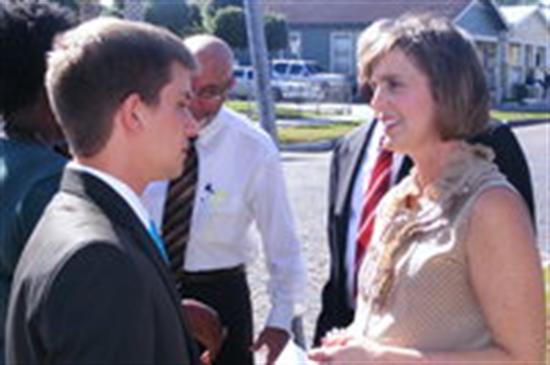Press Release
Castor Highlights Harm of New Voting LawGov. Rick Scott’s Voter Suppression Law Harms Students and Minority Communities
Tampa,
January 26, 2012
Tags:
Equality for All
In advance of Friday’s U.S. Senate Judiciary Committee hearing to be held in Tampa, U.S. Rep. Kathy Castor today joined with leaders in the African American, Hispanic, and student communities to highlight how Gov. Rick Scott’s voter suppression laws are disproportionately harming their communities and the ability to vote.
In advance of Friday’s U.S. Senate Judiciary Committee hearing to be held in Tampa, U.S. Rep. Kathy Castor today joined with leaders in the African American, Hispanic, and student communities to highlight how Gov. Rick Scott’s voter suppression laws are disproportionately harming their communities and the ability to vote. “The diverse group joining me here today is representative of the harm that this new law will cause,” Castor said. “Students are the most likely to have moved and need to update their address on election day and minority voters have historically taken advantage of Early Voting opportunities.” Florida is one of several states across the country to enact laws that will lead to voter suppression. The non-partisan Brennan Center study estimates these new voter laws will make it significantly harder for 5 million voters to cast ballots across the country. “At a time when we should be encouraging more people to participate in our democracy, Gov. Scott and the Florida legislature are doing everything they can to make it harder for our neighbors to vote,” Castor said. “Nothing is more basic in our democracy than the right for our neighbors to vote and if any one person is discouraged or denied that right all of us suffer.” The Florida League of Women Voters discontinued their voter registration efforts citing that they could not put their volunteers at risk and “subject them to a process that can result in their facing financial and civil penalties.” “Governor Scott’s voter suppression law is clearly an attempt to dilute the power of those who may vote against him and his failed policies,” Castor said. “Not only is it harder to register new voters, but this law makes harder for many of our neighbors to exercise their right to vote.” Key features of the Florida Voter Suppression Law:
“Unfortunately, here in Hillsborough County we have a history of past racial discrimination that undermined voting rights and led to a special preclearance designation by the Department of Justice,” Castor said. “We must ensure that we do not repeat the mistakes of the past and do everything we can to inform voters about these new changes that may affect their ability to vote.” Castor has long fought against any efforts that might suppress voter turnout. In 2008 she raised concerns about the lack of early voting locations in minority communities in Pinellas County (see attached letter). Last year, she also joined her Florida colleagues in asking the Department of Justice to use its authority under the Voting Rights Act to review the impact of the Florida law on the five Florida counties currently under preclearance requirements (letter attached). Participants: Kathy Castor – U.S. Representative Janet Cruz - Florida State Representative Charlie Miranda – Tampa City Councilman Rev. Tom Scott – Pastor, former Tampa City Councilman and Hillsborough County Commissioner Yvette Lewis – Hillsborough NAACP Brian Goff - University of South Florida Student Government Attorney General Sylvia Alvarez – National Council of La Raza (NCLR) Maria Pinzon - National Council of La Raza (NCLR) |


